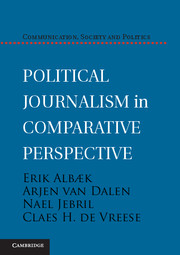Book contents
- Frontmatter
- Contents
- List of Tables and Figures
- Preface
- 1 Introduction
- 2 Comparing Political Journalism
- 3 Journalists
- 4 Journalists and Politicians
- 5 Do Role Conceptions Matter?
- 6 What Type of Journalism Produces Public Knowledge?
- 7 Does Infotainment Journalism Lead to Political Cynicism?
- 8 Good Journalism, Satisfied Citizens?
- 9 Political Journalism
- Appendix to Chapter 2
- Appendix to Chapter 3
- Appendix to Chapter 4
- Appendix to Chapter 5
- Appendix to Chapter 6
- Appendix to Chapter 7
- Appendix to Chapter 8
- References
- Index
5 - Do Role Conceptions Matter?
Published online by Cambridge University Press: 05 June 2014
- Frontmatter
- Contents
- List of Tables and Figures
- Preface
- 1 Introduction
- 2 Comparing Political Journalism
- 3 Journalists
- 4 Journalists and Politicians
- 5 Do Role Conceptions Matter?
- 6 What Type of Journalism Produces Public Knowledge?
- 7 Does Infotainment Journalism Lead to Political Cynicism?
- 8 Good Journalism, Satisfied Citizens?
- 9 Political Journalism
- Appendix to Chapter 2
- Appendix to Chapter 3
- Appendix to Chapter 4
- Appendix to Chapter 5
- Appendix to Chapter 6
- Appendix to Chapter 7
- Appendix to Chapter 8
- References
- Index
Summary
In this book, we try to specify the conditions under which political journalism is most likely to play a positive role in society. A number of conditions have been specified, and in Chapter 3 we saw that political journalists in Denmark, Germany, Spain, and the United Kingdom perceive their roles differently. This finding agrees with a growing body of comparative studies on journalistic cultures. Survey-based research addresses the different ways journalists see their roles (e.g., Donsbach & Patterson, 2004; Weaver & Willnat, 2012; Hanitzsch et al., 2010); a different line of research looks at the actual news content that is produced (e.g., Esser, 2008; Benson & Hallin, 2007). Whether there is a relation between these two factors, however, remains a disputed question, although several cross-national studies on content and others on role conceptions either speculate or presume that variations in role conceptions causes variations in content (Patterson, 1998, 30; de Vreese et al., 2001). For example, Donsbach (2008, 1) comments that role conceptions have “a strong influence on journalists’ professional behaviour” and therefore provide an explanation for differences between news cultures.
Following recommendations by Esser (2008), this chapter studies cross-national differences in journalistic roles in combination with news content. In other words: what is the relationship between the way journalists in a particular country see their role and the way they do their work? This question is addressed by combining a survey of political journalists with the content analysis of political coverage during a routine period in 2007 (see Appendix to Chapter 2 for more details about the methods). We compare the journalistic role conceptions of British, Danish, German, and Spanish political journalists with the content they produce along the three dimensions introduced in Chapter 1 (pragmatic-sacerdotal, impartial-partisan, and information-entertainment).
- Type
- Chapter
- Information
- Political Journalism in Comparative Perspective , pp. 72 - 93Publisher: Cambridge University PressPrint publication year: 2014



